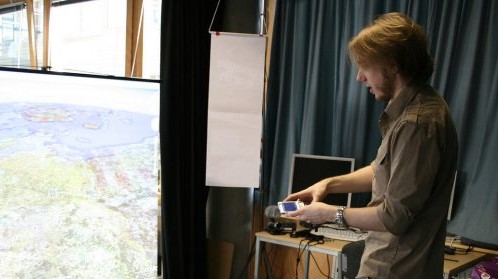
September 7, 2018, by Ben Bedwell
Introducing Ben, a familiar face in a new role
After over a month on the job as Digital Research Specialist for the Faculty of Science, I have just enough time to introduce myself. I am not a new face at the University: you may recognise me from such roles as student, teaching assistant, guest lecturer, student supervisor and co-lead of the Heritage & Digital Research Priority Area. I feel like I have been around the block a few times.
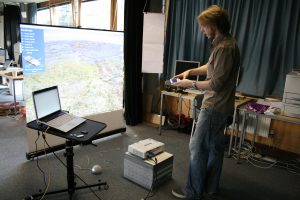
Combining “smart” phones, computers and projectors in 2007
Like all members of the Digital Research Team, I’ve spent plenty of time carrying out academic research. My particular path started in Computer Science just as the dot-com bubble burst. In retrospect that doesn’t sound like the greatest start, but I was intrigued by the way the industry was hyping technologies while 99% of consumers really didn’t understand or care about them. I had friends who had been sold e-commerce systems, promotional websites, and even digital filing systems by companies who had subsequently gone bust, and were now left with technologies they had no idea how to use. I quickly learnt that I enjoyed pulling these systems apart and putting them back together in ways that made sense to the users and solved actual problems. In a short time I was invited into the Mixed Reality Lab as a PhD student, and I challenge any early-career researcher not to be excited by that prospect. If you are unfamiliar with the MRL, ask me for a tour: you’re likely to bump into researchers building theme-park rides driven by biofeedback, buildings that breathe, emotional rocks, mixed-reality wargamers, and a passion for genuinely interdisciplinary research.
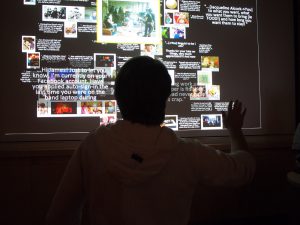
Exploring social media using gestures in Horizon Institute in 2012
So why did I move into a professional role? My time in the MRL and later in the MRL’s more business-minded cousin, the Horizon Digital Economy Research Institute, gave me a constant stream of opportunities to excite other researchers about new technologies, applying apps, web services, wearable technologies, and other gadgets to problems in domains outside of Computer Science. I arrived at a point where realised that this translational work is what I really wanted to be doing: it turns out that there’s a job for that, and it’s where I am now. In the last few weeks I’ve had an excuse to finally visit Brewing Science – and see beer brought together with VR – as well as learning that we simulate black holes, and that if you take the wrong turn on the way to a new office you may end up face-to-face with your worst (irrational) fears. More importantly, I’m having the chance to hear what other researchers would really love to achieve and to start to work with them to show how new technologies can help them achieve it. Ultimately, being a part of the Digital Research Team also gives me a platform to make sure that ambitions within the Faculty are built into the University’s strategy: early-career research roles simply aren’t designed to have that level of impact.
Over the next few weeks I have a couple of opportunities to jump the fence back over into research territory, presenting a couple of my own tools – Wander Anywhere (a web-site that allows users to prototype mobile tours, or any other type of location-based experience), and VisitorBox (a deck of cards to help cultural venues design innovative visitor experiences) – at conferences in Germany and USA.
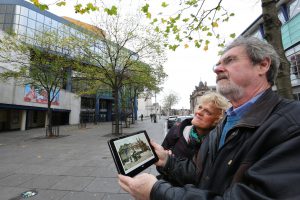
Visitors to Theatre Royal using Wander Anywhere. Photo by Andrew Hallsworth
When I’m back, expect another blog post on the topic of design thinking, and how it underpins VisitorBox and my approach to my new job.
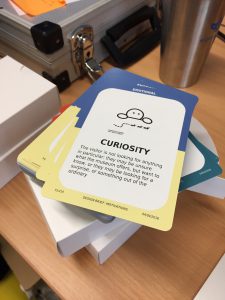
VisitorBox ideation cards
No comments yet, fill out a comment to be the first

Leave a Reply